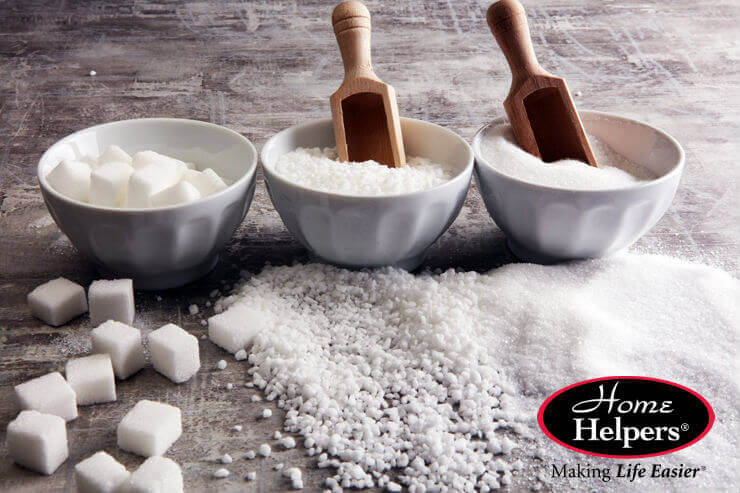Bet you don’t know that there is a link between Alzheimer’s Disease and…. wait for it…. SUGAR! We’ve been told for years how dangerous the effects are from a diet high in processed sugar. It’s not just an issue of getting cavities anymore; sugar has a far more terrible impact on our health than we’ve previously been aware of. A diet full of processed sugar puts you at risk for Type II diabetes, high blood pressure, chronic fatigue, and even increased pain conditions. Sugar also causes your good cholesterol to drop too low and your bad cholesterol shoot sky high. So, what do we do to even begin turning this around? Read on…..
It is now known that sugar has a serious impact on Alzheimer’s Disease, so if you know or care for someone who has Alzheimer’s or dementia, now is the time to help them cut sugar out of their diet because their overall health depends on it! Let’s look at some tips and info that will help you stay aware of the sugar your household is consuming and what you can do about it. There are many myths revolving around the great sugar debate, so we will now break down some of the more known ones.
Natural Sugar vs. Added Sugar
Here’s the most important thing to know about your sugar intake. There are many natural foods, such as fruit, that have lots of natural sugar. The key here is to never use any added sugar or products that claim there is no sugar, but a closer look reveals tons of Nutra Sweet or aspartame or Splenda. When you eat a food that naturally has some sugar, it’s much better for you. When food has its own sugar and then there is also added sugar such as glucose syrup or sucralose, you want to stay away from it! Corn syrup is another big no-no from any diet!
How Do We Know When It’s Too Much?
The American Heart Association strongly warns us to greatly reduce the sugar in our diets. The easiest way to do this is to set a limit of no more than 6 teaspoons (25 grams) for women and 9 teaspoons (37 grams) for men. This means that by the end of the day, men and women will have consumed 100 calories or 150 calories, respectively. These are the calories that come directly from sugar.
Sugar Substitutes and Artificial Sweeteners
So, how do we start reducing our sugar intake? One way is by substituting sugar for a healthier alternative, such as honey, agave nectar, or stevia. Let’s look at those options a bit more closely….
• Honey
Honey does come from nature; therefore, it is a natural sweetener, but it does break down into glucose and fructose, which have negative health effects for diabetics. For healthy people, honey has many health benefits, including an anti-inflammatory property. Honey is also a heart-healthy food.
• Agave
Agave nectar is an appropriate choice because it is very stable in your system and doesn’t cause blood sugar spikes. It is also very low on the glycemic index. However, keep in mind that it does have fructose in it and this would be a problem for diabetics. This spike in blood sugar levels can also cause weight gain, and who wants that?
• Coconut Sugar
This is a smart choice due to its low sugar content, and the many vitamins and minerals to boot. It is not processed and is unrefined, making it a very smart choice for natural sweeteners. Coconut sugar does not cause the extreme blood sugar spikes and is the same calorie content as regular sugar.
• Stevia
Stevia is the new star of the show when it comes to natural sweeteners! It may come in the name brand Truvia, Pure Via, or Rebiana. Because stevia comes from a plant, it does not have calorie content, making it a very safe choice for diabetics.
• Splenda
Sucralose is the main ingredient in Splenda. While it’s tons sweeter than regular sugar, it is still an artificial sweetener. It has no calories and diabetics can usually tolerate it just fine. But some people do not want to eat any artificial sweetener at all. If this is the case, you need to find sweeteners that come from nature, rather than a refining process.
For more helpful tips on caring for seniors, please visit our senior home care blog.
Home Helpers of North San Diego is a locally-owned, trusted home health care agency and offers quality, compassionate senior in-home care services including home care assistance, personal care, companion care, respite care, Alzheimer's & dementia care as well as homemaker services in Oceanside, Carlsbad, Vista, Escondido, San Marcos, Encinitas, Solana Beach, Rancho Santa Fe, Rancho Bernardo, Poway, Scripps Ranch, Rancho Penasquitos, Del Mar, Carmel Valley, Sorrento Valley, University City and LaJolla, California.

